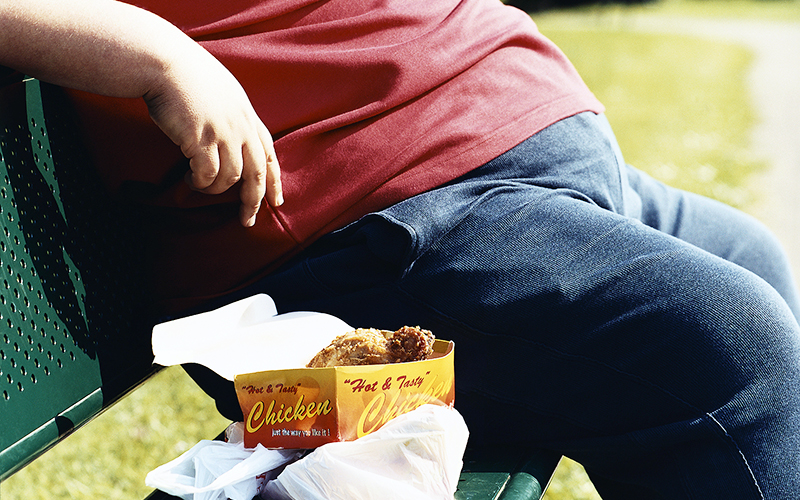
by guest blogger Pam Peeke, MD, MPH, FACP, FACSM, best-selling author and expert on health, fitness, and nutrition
For years I’ve listened to women and men recount an agonizing spectrum of verbal, emotional, and physical abuse and trauma that occurred during their childhood, often continuing through adolescence. Most remember that period in their life as the time when they began to overeat.
Neglect, abandonment, isolation, and physical harm usually send young people on a desperate search for a way to numb and soothe their pain. Of course, food is the main accessible and primal reward. Laurie has her “Cheerios moments”—a habit of bingeing on cereal in the face of anxiety and stress—just as she did when her addict mother would play a twisted game of “Let’s pretend you’re adopted and not a member of this family.” Alice remembers her father adamantly declaring, “No one loves a fat woman.” She was 10, and believing that statement sent her into a panic, with years of fridge raids and bingeing and, eventually, bariatric surgery as an adult. Then there’s Erica, whose As in school were never good enough for her dad, who insisted on A-pluses. Emily endured years of physical and sexual abuse, resulting in constant self-soothing with food and an extra 100 pounds born of her pain.
I call them painful pounds.
The good news is that there is now evidence-based science to explain the connection between the trauma of childhood abuse and weight gain. And it’s beginning to revolutionize how we approach nutrition and weight management.
If you are one of the countless people who continue to repeat endless cycles of every imaginable diet and exercise craze to shed those extra pounds to no avail, early-life abuse and trauma might be a factor you should consider. Mounting scientific evidence is now linking early-life abuse and stress with eating behaviors that can lead to overweight and obesity and disordered eating. Childhood abuse of any kind often leads to self-soothing with foods that can counteract the pain of ongoing emotional and physical abuse. It’s not surprising that overeating hyper-palatable (sugary, fatty, salty) food combinations creates a long-term psychobiological habit of seeking out these products in the face of life’s stresses.
Recently, Harvard researchers studied 57,321 women enrolled in the long-term Nurses’ Health Study II (NHSII), specifically examining the association between child abuse victimization and food addiction, a form of stress-related overeating. They used the Yale Food Addiction Scale to assess the presence of addictive eating patterns. Their findings were striking: Both severe physical and sexual abuse were associated with a stunning 90 percent increase in food addiction risk. Women with food addiction were 6 units of BMI heavier than women without food addiction. The researchers concluded that, “A history of child abuse is strongly associated with food addiction in this population.”
In a follow-up study, the researchers examined the relationship between post-traumatic stress disorder (PTSD) and food addiction. Noting that PTSD appears to increase obesity risk, they once again surveyed the NHSII population, this time studying how food addiction could be related to the age of trauma onset as well as the type of trauma.
Once again, the scientists uncovered extraordinary links, revealing that approximately 80 percent of the study group had been exposed to some kind of trauma, with 66 percent noting at least one lifetime PTSD symptom. As the number of PTSD symptoms increased, so did the prevalence of food addiction. The women who had noted the highest levels of PTSD had more than twice the incidence of food addiction as the women with no PTSD symptoms or trauma history. This study informed health professionals that it is critical to assess past history of any trauma, stress, or abuse in order to individualize treatment plans that directly address how to manage trauma-based behavior.
You may be wondering about your own unique history. First, examine your eating behavior by answering the following two questions:
- If I consume a particular food/beverage, do I feel a loss of control?
- If I consume a particular food/beverage, do I feel shame, blame, or guilt?
Typically, people with addictive binge-eating behavior will answer yes to both questions. If this is the case for you, then the next step is to examine whether abuse and trauma may have played a role in the development of any painful pounds. A simple way to assess this is to take the adverse childhood experience (ACE) assessment and then correlate your score with health consequences. The ACE test was created Vincent J. Felliti, MD, founder of the California Institutes of Preventive Medicine, as a tool to assess the prevalence of abuse and neglect in a population of 17,000 adult Kaiser Permanente Medical Care Program members. Felliti and his team found that almost two-thirds of study participants reported at least one ACE, and more than one in five reported three or more ACEs. As the number of ACEs increased, so also did the risk for an extensive laundry list of conditions, including substance abuse, depression, suicide, domestic violence, poor academic performance, and obesity.
Please keep in mind that you don’t need to have experienced severe childhood abuse to become an adult who self-soothes with food. There’s a wide spectrum of childhood abuse and trauma. Each child or adolescent perceives life events uniquely, and what is traumatic to one might be something another easily manages. The key is to know your own story and, in knowing it, enable yourself to customize a strategy to switch out self-destructive habits for health-promoting behaviors.
Here are some first steps to guide you as you begin your own healing journey.
- Therapy. If you’ve never confronted your past history, it’s advisable to get help in doing that. If you seek out a therapist who specializes in abuse and trauma, he or she can provide homework and immediate practical tools you can use. The key tenets of trauma and abuse-based therapy are to help clients reframe what happened to them and, thus, better manage issues related to trust, safety, and trauma processing—then the person, armed with that knowledge, re-integrates into a healthy and productive life.
- Trauma and food-addiction resources. Here are a few reading and organization resources you might find helpful:
- Bessel van der Kolk, MD, is a renowned trauma expert, and his book The Body Keeps the Score: Brain, Mind and Body in the Healing of Trauma is a terrific summary of abuse and trauma science and therapeutic solutions. The audio version is excellent. His Massachusetts–based trauma center provides client services and hosts events.
- Yoga teacher Ana Forrest is the founder of Forrest Yoga and the author of Fierce Medicine: Breakthrough Practices to Heal the Body and Ignite the Spirit, (also available as an audio book, which she narrates). A child abuse and trauma survivor, she found healing in her yoga practice, eventually creating a unique trauma-healing-focused yoga that is now used worldwide.
- Christine Courtois, PhD, ABPP, is a preeminent scholar in trauma science and therapy. Her seminal scholarly text is Treatment of Complex Trauma: A Sequenced, Relationship-Based Approach. She recently wrote It’s Not You, It’s What Happened to You for a more general audience; in it, she outlines practical steps for reframing the past and beginning the healing process.
- I address trauma-based food addiction in my book The Hunger Fix: The Three Stage Detox and Recovery Plan for Overeating and Food Addiction. Professionals can find the clinical and bench science studies on the topic in Food and Addiction, a textbook edited by Kelly Brownell and Mark Gold.
Becoming aware of the abuse-weight connection is key to beginning your own healing journey. Taking action requires courage, self-compassion, and support. In his poem “Invictus,” the poet William Ernest Henley declared that each of us has an “unconquerable soul.” The poem ends with the line “I am the master of my fate, I am the captain of my soul.”
Believe those words and let the healing begin.
 Pamela M. Peeke, MD, MPH, FACP, FACSM, is an internationally renowned expert in integrative and preventive medicine. Dr. Peeke is a Pew Foundation Scholar in nutrition and metabolism, assistant professor of medicine at the University of Maryland, and a fellow of the American College of Physicians and American College of Sports Medicine. A nutrition and fitness pioneer, she has been the recipient of numerous fitness-industry lifetime achievement awards, including the IDEA Health and Fitness Association Inspiration Award and the Zumba Fitness International Role Model Award. Known as “the doc who walks the talk,” Dr. Peeke is a Senior Olympic triathlete and a member of the National Senior Games Foundation Board. As senior advisor to the 18th Surgeon General of the U.S., Regina Benjamin, MD, MBA, Dr. Peeke created the Surgeon General’s Walks for a Healthy and Fit Nation program. Dr. Peeke’s work includes WebMD’s lifestyle expert, Discovery Health TV’s chief correspondent for nutrition and fitness, host of both Discovery Health TV’s series Could You Survive? and National Body Challenge, acclaimed TEDx presenter, and regular commentator for the national networks. Dr. Peeke is a New York Times best-selling author; her books include Fight Fat after Forty, Body for Life for Women, and The Hunger Fix.
Pamela M. Peeke, MD, MPH, FACP, FACSM, is an internationally renowned expert in integrative and preventive medicine. Dr. Peeke is a Pew Foundation Scholar in nutrition and metabolism, assistant professor of medicine at the University of Maryland, and a fellow of the American College of Physicians and American College of Sports Medicine. A nutrition and fitness pioneer, she has been the recipient of numerous fitness-industry lifetime achievement awards, including the IDEA Health and Fitness Association Inspiration Award and the Zumba Fitness International Role Model Award. Known as “the doc who walks the talk,” Dr. Peeke is a Senior Olympic triathlete and a member of the National Senior Games Foundation Board. As senior advisor to the 18th Surgeon General of the U.S., Regina Benjamin, MD, MBA, Dr. Peeke created the Surgeon General’s Walks for a Healthy and Fit Nation program. Dr. Peeke’s work includes WebMD’s lifestyle expert, Discovery Health TV’s chief correspondent for nutrition and fitness, host of both Discovery Health TV’s series Could You Survive? and National Body Challenge, acclaimed TEDx presenter, and regular commentator for the national networks. Dr. Peeke is a New York Times best-selling author; her books include Fight Fat after Forty, Body for Life for Women, and The Hunger Fix.




What an insightful piece you wrote here, Maria! I have never heard anyone articulate this concept before. As time goes by one recognizes their reasons for self soothing but that is not the same as modifying behaviors in a healthy way. Thanks. Hope more health care providers recognize this issue.